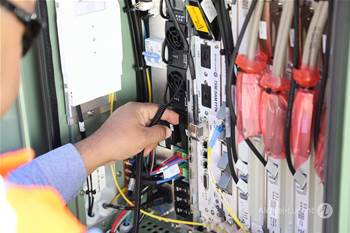NBN Co claims future - presumably discretionary - upgrades of its fibre-to-the-node (FTTN) services and to “rehabilitation of the copper network” are under threat because of a punitive rebate scheme proposed by regulators.
The threat is contained in an extensive rebuttal to the Australian Competition and Consumer Commission’s (ACCC’s) plan to impose much higher service standards on NBN Co, and to financially penalise the company more when the standards aren’t met.
The proposed regime includes fines of:
- $13.50 per business day - capped at $270 - for late or delayed connections to its network
- $30 a day - capped at $1150 - for slow fault fixes
- $75 when its technicians miss appointments, up from $25
To date, most of NBN Co’s arguments against the plan have not been made public.
However, they were laid bare late Friday last week in an extensive 75-page rebuttal.
NBN Co’s overarching position is largely unchanged: it wants to “negotiate” service standard changes with retail service providers (RSPs) via the new wholesale broadband agreement process (WBA4).
The network builder is acutely aware that a formal ACCC decision would re-baseline WBA4 negotiations, and afford RSPs significantly more power, knowing they could fall back on the ACCC terms if unable to collectively negotiate anything stronger.
What is now in the open is what NBN Co claims the long-term cost of paying out rebates on problematic services and technician no-shows will be.
That cost, according to NBN Co, will be felt disproportionately by the millions of users currently in the FTTN footprint.
According to NBN Co, “highly impactful initiatives currently being considered, subject to funding availability, that could potentially be cancelled, delayed or reduced in scale to accommodate the investments NBN Co will need to make to comply with the [ACCC], and to pay relevant rebates, include ... upgrading FTTN services to FTTC … [and] remediation and rehabilitation of the copper network”.
NBN Co has not publicly committed to any upgrade of the FTTN footprint, but has started testing the technical feasibility of upgrades.
NBN Co also says that programs aimed at fixing in-home wiring and home wi-fi, as well as “targeted incentive programs designed to encourage higher take-up among under-served market segments” were also likely to slip.
NBN Co branded the ACCC’s rebates “excessively high” and “often set at multiples of any relevant benchmark”.
It argued meeting them “would focus significant NBN resources on priorities which do not reflect customer preferences.”
NBN Co also claimed the ACCC’s intervention would create a “regulatory overhang” on the WBA4 negotiation process.
It pleaded with the ACCC to take a back seat at what it painted as a critical juncture in the Australian telecommunications industry.
“Any ... intervention would be pre-emptive and hinder the development of industry-led commercial solutions at a critical juncture in the maturation of the structurally separated industry,” it said.
“NBN Co needs to be given the opportunity: (a) to offer specific commitments to access seekers in exchange for specific commitments from those access seekers to progress their own customer experience initiatives, so that both parties align their efforts and improve service delivery in a way that has an appreciable impact for end user customers; and (b) to deliver customer experience initiatives that are informed by extensive market research and experience of operating a broadband access network.
“[The ACCC rules], if made, will inevitably shift the focus of WBA4 negotiations to the terms of the [rules], which will form the baseline commitments that NBN Co must make without any corresponding commitments from access seekers.”





.jpg&h=140&w=231&c=1&s=0)




















